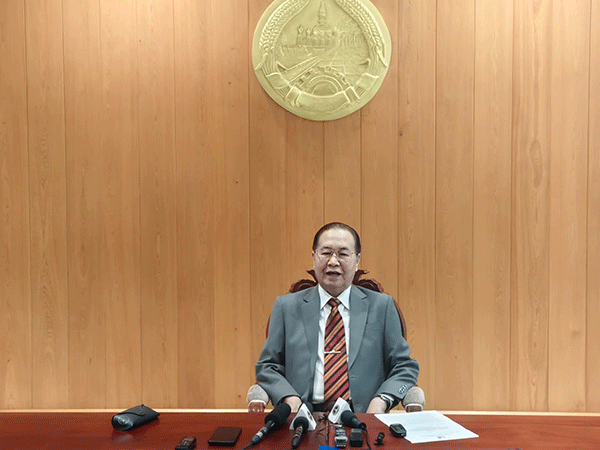Constitutional amendments outline key changes
Amendments to the constitution, which are currently being drafted, are expected to give more power to local administrations, target the development of an independent economy, and combat corruption.
These are some of the key changes expected to the fundamental rules determining the governance of Laos.
 |
| Prof. Dr Chaleun Yiapaoher. |
Among the draft amendments, Article 88 specifies the mandate for local administrations with regard to formulating strategy plans, socio-economic development and budget plans, and defence and security plans for their localities.
Local administrations are mandated to draw up and execute these plans and oversee the overall development of their areas. This specification is not contained in the existing constitution, which merely states that provincial governors are responsible for presenting these plans to the Provincial People’s Council for approval.
Other changes proposed include referring to provincial governors as presidents of provincial administration committees, and the Mayor of Vientiane as the President of the Vientiane administration committee.
Provincial People’s Councils and the Vientiane People’s Council are empowered to approve the organisational structure of their administration committees and key positions.
The draft amendments are still subject to revision, but the final drafts will be submitted to an extraordinary session of the National Assembly expected to take place between March 31 to April 4 for approval, the Assembly’s Vice President, Prof. Dr Chaleun Yiapaoher, told local media last week.
This is the third revision of the constitution, which is being undertaken to bring about sweeping changes in the state power system, while also spurring the creation of an independent economy in an environmentally friendly and green-growth manner, according to the 30-page draft.
The changes being made also empower auhtorities in charge of combating corruption through newly-added articles, which specify the roles of the State Inspection Authorities (SIA) and State Auditing Organisation (SAO) - the two key bodies overseeing auditing, investigating and preventing corruption.
The president of the SIA, who is elected by the National Assembly, is answerable to the state President and the NA with regard to inspection and anti-corruption matters. The mandates of the SIA and SAO and their presidents are outlined in the new constitution, to bolster efforts to prevent misconduct.
Other revisions stress the need to take into account public opinion when it comes to enhancing solidarity and encouraging people of all ethnic groups to participate in national defence and development, along with enhancing the ownership rights of Lao citizens.
The amendments also seek to enhance unity among Lao people in the motherland and those living abroad. The state, under the amendments, regards Lao people living abroad as inseparable kinsfolk.
“The state encourages and creates conditions for Lao people living abroad to preserve and promote the sound culture of the nation, and maintain a good relationship with their families, relatives and homeland so they can make a contribution to the construction and development of Laos,” the draft of Article 47 states.
The draft has been in the making since June 2024, according to Dr Chaleun, who is also Vice President and Head of the Secretariat of the national committee in charge of formulating the amendments.
The first constitution of the Lao PDR was adopted in 1991, almost 16 years after the Lao People’s Democratic Republic was proclaimed on December 2, 1975. It was subsequently amended in 2003 and 2015.
By Souksakhone Vaenkeo
(Latest Update January 20, 2025)
|


